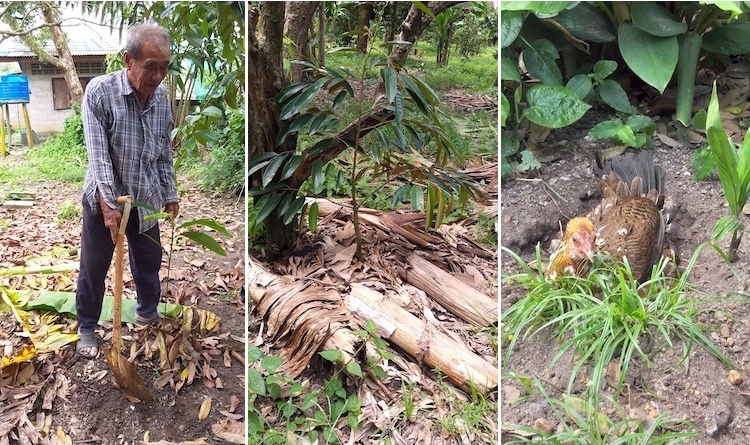By Bronwen Evans*
CHANTHABURI, Thailand (IDN) – There are generally two reasons why Thai farmers embrace organics – one is health and the other is economics. For 73-year old Kumnung Chanthasit it was the latter. He had farmed the same plot of land in Thailand’s eastern province of Chanthaburi since boyhood. Despite the rich volcanic soil, he found himself sinking deeper and deeper into debt as he struggled to pay for the fertilisers and pesticides he thought he needed. INDONESIAN | JAPANESE | TAGALOG | THAI
Finally, 26 years ago he was inspired to try a different path, that of the “sufficiency economy” as taught by Thailand’s late King Bhumibol Aduladej, an integrated farming system that could support a family on just four acres – and Kumnung had eight.
Following these principles, he created a diverse garden of fruit trees, fishponds, herbs and chickens, while replacing chemical pesticides and fertilisers with composts and organic teas made with his own herbs and fruit waste. His system is so successful he managed to pay back his debts, and now earns enough to live comfortably with his children and grandchildren and has become a well-respected teacher of the methods.
The first thing to notice when visiting his farm is the soil which is full of worms and humus and the abundant ground cover which includes massive clumps of pandanus and cardamom, which have been divided up and propagated over many years. These companion plants to his fruit trees increase biodiversity and encourage microorganisms, while also providing year-round revenue. Water for the gardens comes from fishponds which add to the nutrients in the soil.
Meanwhile a flock of around 100 wild chickens, descendants of the indigenous Thai red jungle fowl, till the soil, keep insect pests at bay, and provide eggs. He also uses the eggs to produce his own home-made hormone stimulant which encourages the fruiting and flowering of his trees.
The trees in the forest garden look vigorous and healthy, with dark green leaves, a testament to the richness of the soil. Mainly he grows the tropical fruit that does so well in Thailand’s southeast region such as durian, mangosteen, longkongs, and rambutan. There are also papayas, bananas and coconuts as well as limes. The tallest trees are durian, native to southeast Asia, which can grow up to 45 metres tall and have massive branches that carry the spikey, football-sized fruit.
In Thailand it is called the king of the fruits and its sweet creamy flesh is hugely popular in Asia, commanding high prices. One of the durian trees in Kumnung’s orchard is 55-years old, which he says produces 100-150 kilogrammes of fruit a year, providing annual earnings of over $3,000. In the middle layer of the forest there are longkongs and mangosteen, then lime trees, and at ground level, herbs and a new generation of recently planted durian trees.
In Thailand the durian tree is called the king of the fruits and its sweet creamy flesh is hugely popular in Asia, commanding high prices.
As the trees grow up, they crowd out the sun loving bananas which, when they are cut down add fibre, microorganisms and potassium to the soil. Pepper plants climb up some of the trees.
In addition to concepts that are common to biodynamics and permaculture such as limit disturbance to the soil, keep soil covered with plants, have diverse plantings, and integrate animals into the system, Kumnung follows King Bhumibol’s philosophical teachings on the sufficiency economy.
These focus on human behavior and the cultivation of qualities such as moderation, reasonableness, and adequate immunity against unforeseen events or crises. We should possess a broad knowledge, be thoughtful and careful and ethical in our behavior, act with honesty, integrity, diligence and self-control. Since Thailand is a Buddhist country, the sufficiency economy draws inspiration from Buddhism and includes concepts such as following the “middle path” and avoiding extremes such as extreme self-deprivation or excessive consumption.
An integral part of the philosophy is aiming for independence in our daily lives. So, we should not be wasteful but take just enough of our earnings or production to sustain ourselves – the rest we should divide up – give away some, save some, and sell some. By following this path, we can become resilient and can experience balance and harmony in our lives.
Recently Kumnung divided up his land for his three children. It is incredible that just eight acres can support so many people. What a great testament to the value of building up the soil, planning and creating a dynamic ecosystem.
Note: Bronwen Evans is an award-winning journalist and broadcaster, formerly from New Zealand. She has been living in Thailand for 20 years where she has created an eco-resort in Chanthaburi on the southeast coast Faasai Resort and Spa committed to responsible tourism as well as a nature sanctuary and organic farm that draws on permaculture principles. [IDN-InDepthNews – 21 September 2019]
Photo collage: (left to right) Kumnung Chantasit demonstrating how to plant cardamom; An example of how banana trunks and leaves are used to protect the young trees; One of the hard working Thai chickens. Credit: Bronwen Evans.




